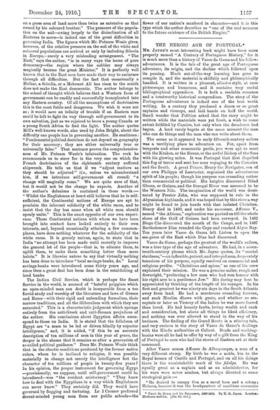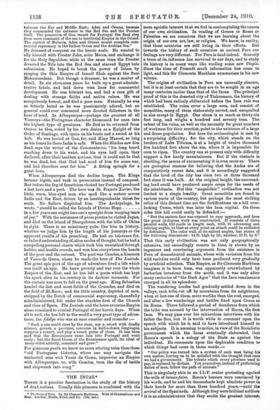THE HEROIC AGE OF PORTUGAL.*
ME. JAYNE'S most interesting book might have been more properly named "A Century of Portuguese History," for it is much more than a history of Vasco da Gama and his fellow- adventurers. It is the tale of the great age of Portuguese adventure, its origin, and the decline which followed upon its passing. Much out-of-the-way learning has gone to compile it, and the material is skilfully and philosophically handled. It is written in a pleasant, allusive style, at once picturesque and humorous, and it contains very useful bibliographical appendices. It is both a readable romance and a trustworthy historical compendium. The story of the Portuguese adventurers is indeed one of the best worth writing. In a century they produced a dozen or so great captains and viceroys, and laid hands on half the world. Small wonder that Politian asked that the story might be written while the materials were yet fresh, a wish to some extent fulfilled by Cam6es, but only when the decadence had begun. A land rarely begets at the same moment the man who can do things and the man who can write about them.
The ocean as it appeared to early fifteenth-century sailors was a terrifying place to adventure on. For, apart from tempests and other reasonable perils, you were apt to meet with the Kraken, or the Sirens, or the awful Bishop of the Seas with his glowing mitre. It was Portugal that first dispelled this fog of terror and sent her sons voyaging to the Canaries and the South. A great Prince, Henry the Navigator, son of our own Philippa of Lancaster, organised the adventurous spirit of his people; though his purpose was crusading rather than commercial or political. His knights discovered Bilad Ghana, or Guinea, and the Senegal River was assumed to be the Western Nile. The imagination of the world was domi- nated by Prester John, who was supposed to rule in the Abyssinian highlands, and it was hoped that by this river a. way might be found to join hands with that isolated Christian. Henry died in 1460, and under his successor, Affonso V., named " the African," exploration was pushed on till the whole shore of the Gulf of Guinea had been surveyed. In 1482 Diego Cao discovered the mouth of the Congo, and in 1487 Bartholomew Dias rounded the Cape and reached Algoa Bay. Ten years later Vasco da Gama left Lisbon to open the sea-gates of the East which Dias had discovered.
Vasco da Gama, perhaps the greatest of the world's sailors, was a true type of the age of adventure. He had, in a seven- teenth-century phrase which Mr. Jayne quotes, its " mortal staidness,"—an inflexible, patient, and intrepid man, desperately tenacious of his purpose, equally resolved on commercial and religious profits. "Christians and spices," so one of his crew explained their mission. He was a genuine sailor, rough and downright, "preferring a low man who had won honour with his right arm to a gentleman Jew." His daring may best be appreciated by thinking of the length of his voyages. In his first and greatest he was ninety-six days in the South Atlantic away from land. He had a murderous crusading fervour, and sank Muslim dhows with gusto, and whether as sea- captain or later as Viceroy of the Indies he was more feared than loved. He had homely faults, loving wealth and rank and consideration, but above all things he liked efficiency, and nothing was ever allowed to stand in the way of his business. The finding of the Grand Route is a stirring tale, and very curious is the story of Vasco da Games dealings with the Hindu authorities at Calicut. Beads and washing- basins were all he had to offer by way of a gift from the King of Portugal to men who had the stores of Eastern art at their command.
After Vasco comes Affonso de Albuquerque, a man of a very different stamp. By birth he was a noble, kin to the Royal houses of Castile and Portugal, and on all his doings there is the unmistakable mark of the fidalgo. He was equally great as a captain and as an administrator, for his wars were never aimless, but always directed to some strategical gain :— " He desired to occupy Goa as a naval base and a colony; Malacca, because it was the headquarters of maritime commerce
• Vasco da Gana and his Successors, 14604680. By X. G. Jayne. Londe*: Methuen and Co. [10s. 6d. net.]
between the Far and Middle East ; Aden and Ormuz, because they commanded the entrance to the Red Sea and the Persian Gulf. The possession of Goa meant for Portugal the final step from mere command of the sea to territorial Empire in the Orient. The control of Malacca, Aden and Ormuz meant complete com- mercial supremacy in the Indian Ocean and the Arabian Sea."
He dreamed of conquest on the heroic scale. He wanted to ally himself with Prester John, seize Mecca, and exchange it for the Holy Sepulchre, while at the same time the Prester diverted the Nile into the Red Sea and starved Egypt into submission. He hoped to break the power of Islam by ranging the Shia Empire of Ismail Shah against the Suni Mohammedans. But though a dreamer, he was a master of detail. In six strenuous years he built up a great adminis- trative fabric, and laid down wise lines for commercial development. He was tolerant too, and had a rare gift of dealing with strange faiths and native rulers. He was scrupulously honest, and died a poor man. Naturally he was as bitterly hated as he was passionately adored, but no general could ever command more devoted followers in the hour of need. In Albuquerque—perhaps the greatest of all Viceroys—the Portuguese character blossomed for once into the highest type of greatness. He died as he returned from Ormuz to Goa, robed by his own desire as a Knight of the
Order of Santiago, with spurs on his boots and a sword at his belt. He was buried at Goa, for, said King Manoel, so long
as his bones lie there India is safe. When the Hindus saw him dead, says the writer of the Commentaries, " his long beard reaching down to his waist, and his eyes half open, they declared, after their heathen notions, that it could not be that he was dead, but that God had need of him for some war, and had therefore sent for him." A fitting epitaph for a great hero.
When Albuquerque died the decline began. The Kings
became bigots, and took to persecution instead of conquest. But before the fog of fanaticism choked her Portugal produced
a last hero and a poet. The hero was St. Francis Xavier, the little, worn, blue-eyed man who sped like a meteor across India and the East, driven by an inextinguishable thirst for souls. No failure dispirited him. The Archipelago, he wrote, "should be called the Islands of Divine Hope in a few years one might lose one's eyesight from weeping tears of joy." With the assistance of pious pirates be visited Japan, and died on the island of Shangchwan with the hills of China in sight. There is no missionary quite like him in history, whether we judge him by the length of his journeys or the apparent results of his preaching. He had no tolerance for, or indeed understanding of, alien modes of thought, but he had a compelling personal charm which took him unscathed through
battles and hostile crowds, and won him everywhere the hearts of the poor and the outcast. The poet was Camoes, a kinsman of Vasco da Gama, whom he made the hero of The Lusiads. The great epic poet of the age of adventure lived a life which was itself an epic. He knew poverty and war over the whole
Empire of the East, and he has left a poem which has kept the spark alive in his country in its darkest moments. For the curtain was soon to fall on the great age. King Sebastian headed the last and most futile of the Crusades, and died on the field of El-Karr; and the little country, depleted of men,
stripped by the Dutch of commercial supremacy, shamefully misadministered, fell under the shackles first of the Church and then of Spain. The Lusiads and the loose overseas Empire
alone remained to remind Portugal of her heroic days. When all is said, she has left to the world a very great type of adven-
turer, the ficialgo who was at once courtier and crusader :- "Such a one could steer by the stars, use a sword with deadly science, govern a province, converse in half-a-dozen languages, compose a sonnet, and play a sound game of chess. It has been said that the Renaissance came late into Portugal and went early ; but the finest bloom of the Renaissance spirit, its ideal of many-sided activity, remained and grew."
For generous youth we know no more stirring tales than these "old Portuguese histories, where one may navigate the uncharted seas with Vasco da Gama, improvise an Empire with Albuquerque, or, with Camoes, turn the din of battle and shipwreck into song."







































 Previous page
Previous page